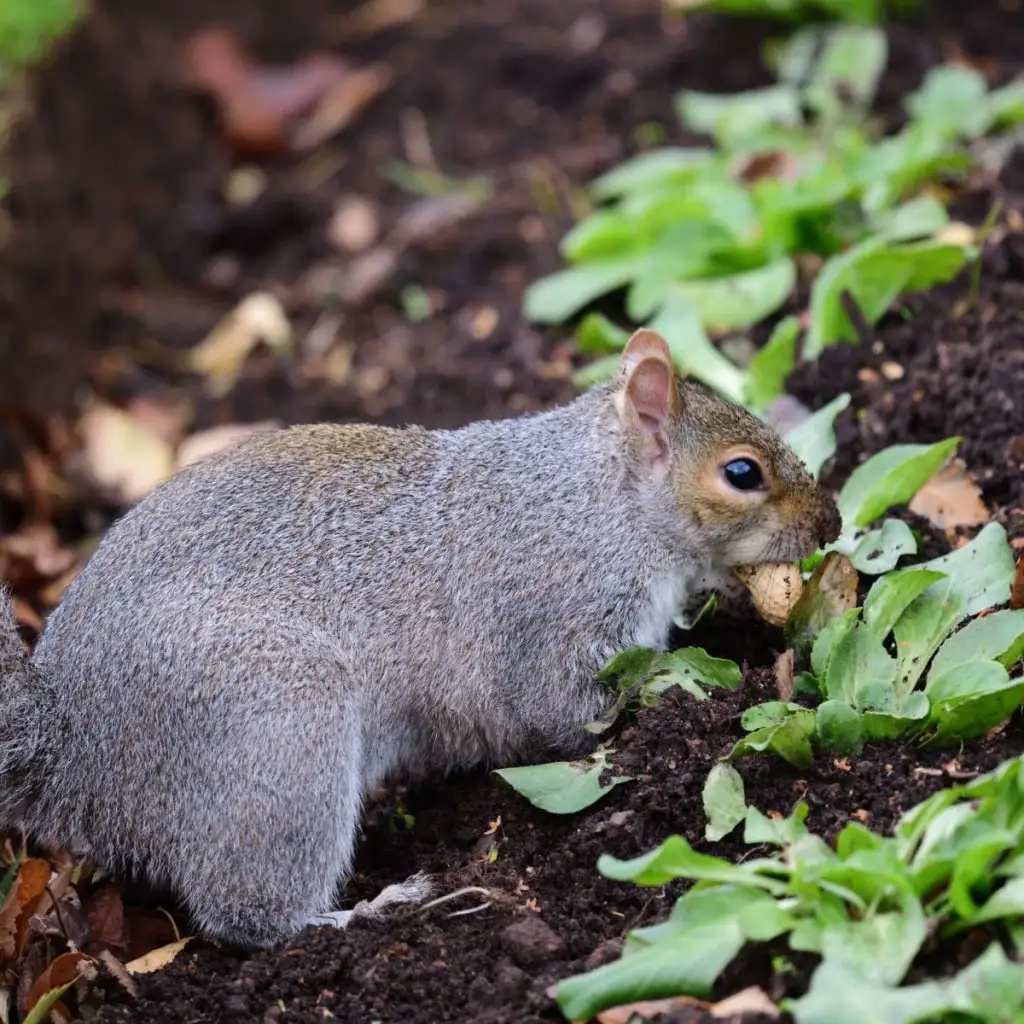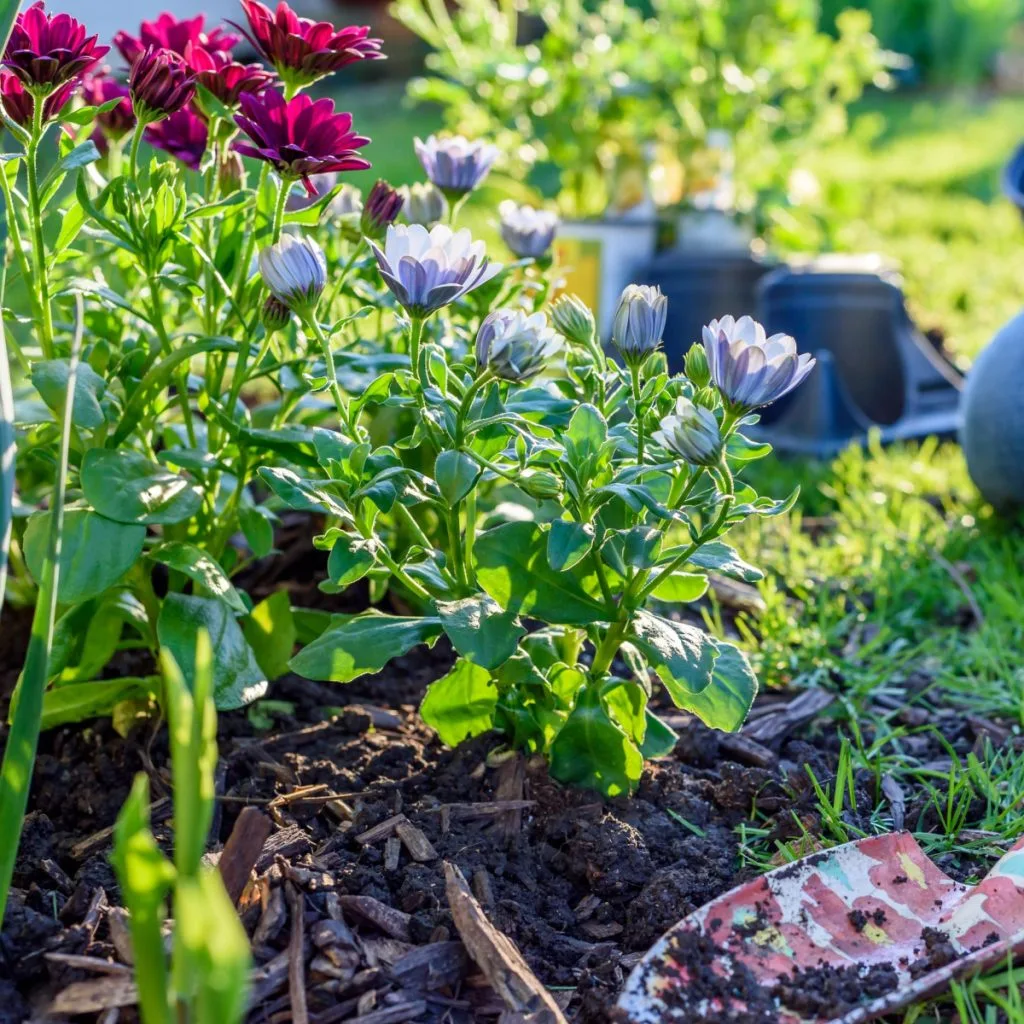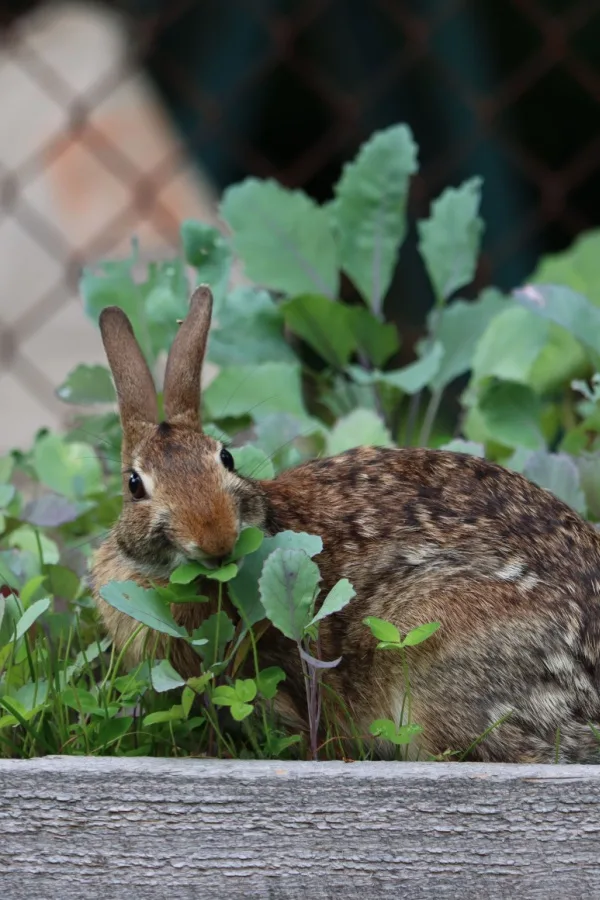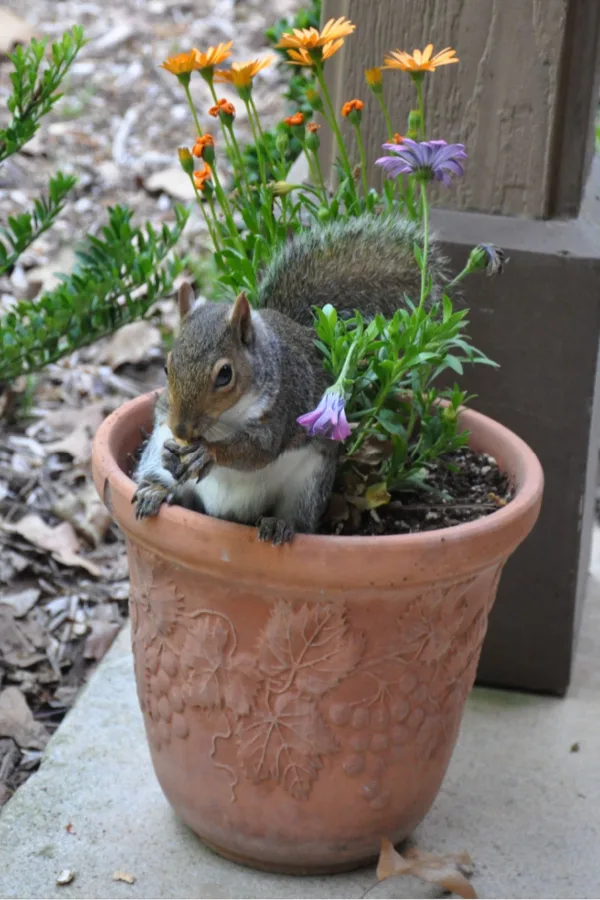Looking for a few simple, safe and effective ways to keep squirrels and chipmunks from digging up the plants and bulbs in your flowerbeds, pots and containers this spring?
As soon as spring arrives and the soil begins to warm, so do the gardening challenges that come with it. Especially when it comes to squirrels and chipmunks digging up freshly planted flowers, vegetables, and bulbs.
Although the small little animals may look cute, when they start tearing through garden beds or containers, the charm quickly wears thin. Whether they’re burying or looking for food, hiding seeds, or just curious, their digging can be incredibly frustrating to gardeners. And damaging as well! The good news? With a few simple, safe and natural methods – you can keep your plants safe!

How To Keep Squirrels & Chipmunks From Digging Up Plants
Why Squirrels And Chipmunks Dig In Spring
Before looking at how to stop them, it’s helpful to understand why both of these animals dig in the first place. Spring is a time when squirrels and chipmunks are actively foraging for food after the long winter months. They also begin preparing nests and raising young.
Because of all of that, it means that squirrels and chipmunks are busy storing food and creating comfortable, protected spaces. And soft soil and freshly dug planting areas are the perfect spots for them to explore for just that.
Even worse, bulbs and seedlings often smell like food to them. Tulips, crocus, and other spring bulbs are particularly appealing, and squirrels will sometimes dig them up just out of curiosity. Container plants and flower beds that have recently been planted are also easy targets because the soil is loose, and any scent of fertilizer, compost, or plant oils will quickly draw attention.
So how do you stop them? There are actually a couple of different methods that work – with the first being to try to keep the look and smell of fresh soil to a minimum. And one of the best ways to do that is with mulch.
Using Mulch To Keep Squirrels & Chipmunks From Digging
While mulch is a must have for holding in moisture and preventing weeds, it can also double as a deterrent for squirrels and chipmunks. Especially if you use the right kind!

When mulching for pests – it’s best to avoid soft, fluffy mulches in problem areas. Instead, go for options with a coarse or prickly feel. Pine needle mulch and shredded bark with rough edges are ideal. These textures are unpleasant for little paws to dig through. They’ll often leave these spots alone in favor of easier places to dig.
If you’re planting bulbs in the fall for spring blooms, make sure to mulch immediately after planting. This not only insulates the soil, but it hides the scent and sign of freshly dug soil, which is what attracts squirrels in the first place.
Using Hot Pepper Spray To Stop Digging
One of the easiest and most natural ways to keep squirrels and chipmunks at bay is with hot pepper spray. The spicy mix irritates their nose, mouth, and paws, causing them to quickly learn your garden beds are not a place to play or dig.
It won’t harm the animals. It just makes your plants and soil an unpleasant experience they’ll want to avoid. See: How To Make & Use Hot Pepper Spray – Protect Plants From Insect & Animal Damage Naturally!

You can make your own hot pepper spray using a few basic ingredients:
Homemade Hot Pepper Spray Recipe:
- 1 gallon of water
- 2 tablespoons of hot pepper flakes or 1–2 finely chopped hot peppers (like cayenne or habanero)
- 1 tablespoon of dish soap (this helps the spray stick to plants and soil)
To make the spray, boil the water and add the hot peppers or flakes. Let the mixture steep overnight to draw out the spicy oils. Once cooled, strain out the solids and add the dish soap. Pour into a spray bottle or garden sprayer and apply generously.
Spray the mixture directly onto the soil where you’ve planted bulbs or new seedlings. You can also spray it lightly onto the leaves of plants if you’ve noticed chewing or damage, but be careful not to oversaturate delicate plants. For bulbs, it’s especially helpful to spray the soil surface right after planting.
The key to success with pepper spray is frequent reapplication. Rain, heavy dew, or even frequent watering can wash the spray away. During wet spring weather, you may need to reapply every few days.
On dry weeks, once or twice a week is often enough. Keep an eye on digging activity. When you start to see signs of new holes, it’s time to re-spray. You can also sprinkle crushed red pepper flakes or powdered cayenne directly on the soil surface around plants for an extra layer of protection.

Use Natural Barriers Over Soil
Another great way to prevent squirrels and chipmunks from digging is by using physical covers on the soil surface. Right after planting bulbs or seeds, cover the soil with chicken wire, mesh, or hardware cloth. This will totally stop them from getting under the soil. Affiliate Link: Hot-Dip Galvanized Welded Hardware Cloth,1/2inch
After placing your bulbs or plants in the ground, lay a piece of chicken wire flat over the soil and pin it down with landscape staples. You can cut holes in the mesh for your plants to grow through, or simply remove it once your plants have taken root. For bulbs, you can leave the mesh in place until after they sprout, then remove it.
Plant Less Appealing Bulbs And Companion Plants
Finally, you can also use companion planting to help keep squirrels and chipmunks from digging up plants. Some plants naturally turn off squirrels and chipmunks because of their smell or taste. You can take advantage of this by using them as a natural barrier.

For bulbs, consider planting daffodils, alliums, or hyacinths. These are less likely to be dug up because they are either toxic or unappealing to most small animals.
If you already have trouble areas where you like to plant tulips or crocus, try surrounding them with these less tasty options. For example, you can plant a ring of daffodils around a cluster of tulips. The scent of the daffodils can help protect the more vulnerable bulbs in the center.
In garden beds, herbs like rosemary, lavender, and mint can also serve as natural deterrents. Their strong smells often confuse or repel digging animals. You can plant these herbs throughout your beds or keep small pots of them near containers you want to protect. Affiliate Link: Lavender Plants
A Few Extra Tips
When trying to protect your garden from squirrels and chipmunks, it’s important to remain consistent. Most methods don’t work overnight. Animals will test and explore, and it may take a week or two of persistent deterrents before they fully avoid the area.
It’s also helpful to avoid feeding wildlife in or near your garden. Bird feeders can attract squirrels and chipmunks, and once they associate your yard with food, they’re more likely to dig in. If you do feed birds, consider placing feeders away from your garden beds or invest in squirrel-proof feeders.
Here’s to keeping squirrels and chipmunks from digging up your plants this spring – naturally!
Simple Garden Life
Follow Our Facebook Page For Even More Great Tips! Simple Garden Life Facebook Page
Simple Garden Life is a website dedicated to keeping gardening fun, simple and enjoyable! We publish two new articles each week along with a new garden podcast episode every two weeks. This article may contain affiliate links.
